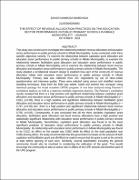| dc.description.abstract | ABSTRACT
This study was carried out to investigate the relationship between revenue allocation and education sector performance in public primary schools in Mbale Municipality. It was conducted under three specific objectives namely: To examine the relationship between capitation grant allocation and education sector performance in public primary schools in Mbale Municipality, to examine the relationship between facilitation grant allocation and education sector performance in public primary schools in Mbale Municipality and to examine the relationship between local revenue allocation and education sector performance in public primary schools in Mbale Municipality. The study adopted a correlational research design to establish how each of the constructs of revenue allocation relates with education sector performance in public primary schools in Mbale Municipality. Primary data was collected from 201 respondents by use of close-ended questionnaires and interview guides. These were selected using census and stratified random sampling techniques. Data from the field was edited, coded and entered into computer using statistical package for social scientists (SPSS) program. It was later analyzed using Pearson’s correlation analysis as well as a stepwise multiple regression analysis. The Pearson’s correlation results revealed that there is a high positive and significant relationship between capitation grant allocation and education sector performance in public primary schools in Mbale Municipality (r = 0.813, p<0.05), there is a high positive and significant relationship between facilitation grant allocation and education sector performance in public primary schools in Mbale Municipality (r = 0.767, p<0.05) and there is a high positive and significant relationship between local revenue allocation and education sector performance in public primary schools in Mbale Municipality (r = 0.750, p<0.05). Consequently, it was concluded that all the three variables (capitation grant allocation, facilitation grant allocation and local revenue allocation) have a high positive and statistically significant relationship with education sector performance in public primary schools in Mbale Municipality. Nevertheless, capitation grant allocation was found to be the most significant predictor of education sector performance in public primary schools in Mbale Municipality. Its relationship with education sector performance in Mbale Municipality was found to be 0.813; its effect on the sample was 0.662 while its effect on the total population was 0.666.Among others, the study recommended that the government increases on the amount of both capitation and facilitation grant and all efforts be made to ensure that the grant is sent to the schools at least before opening of each term. Similarly, several stakeholders including the general community should also be involved in monitoring the utilization of the grant. This would encourage the community to take an active role in affairs of the UPE schools and therefore part of the UPE program. | en_US |

